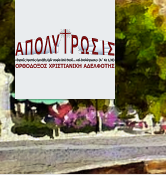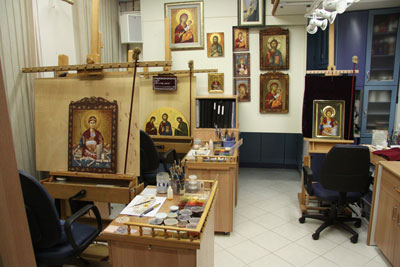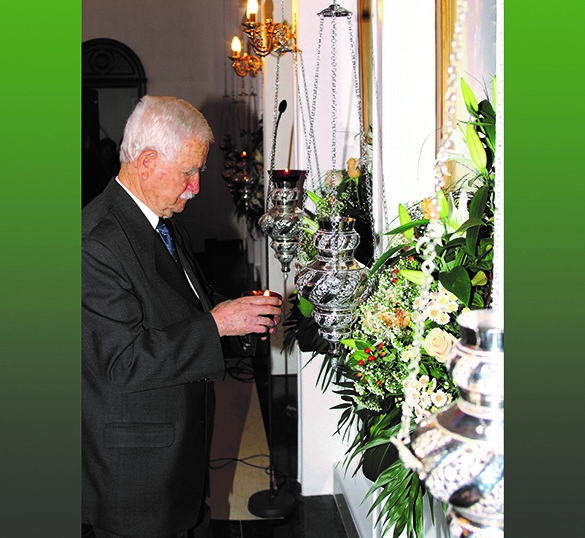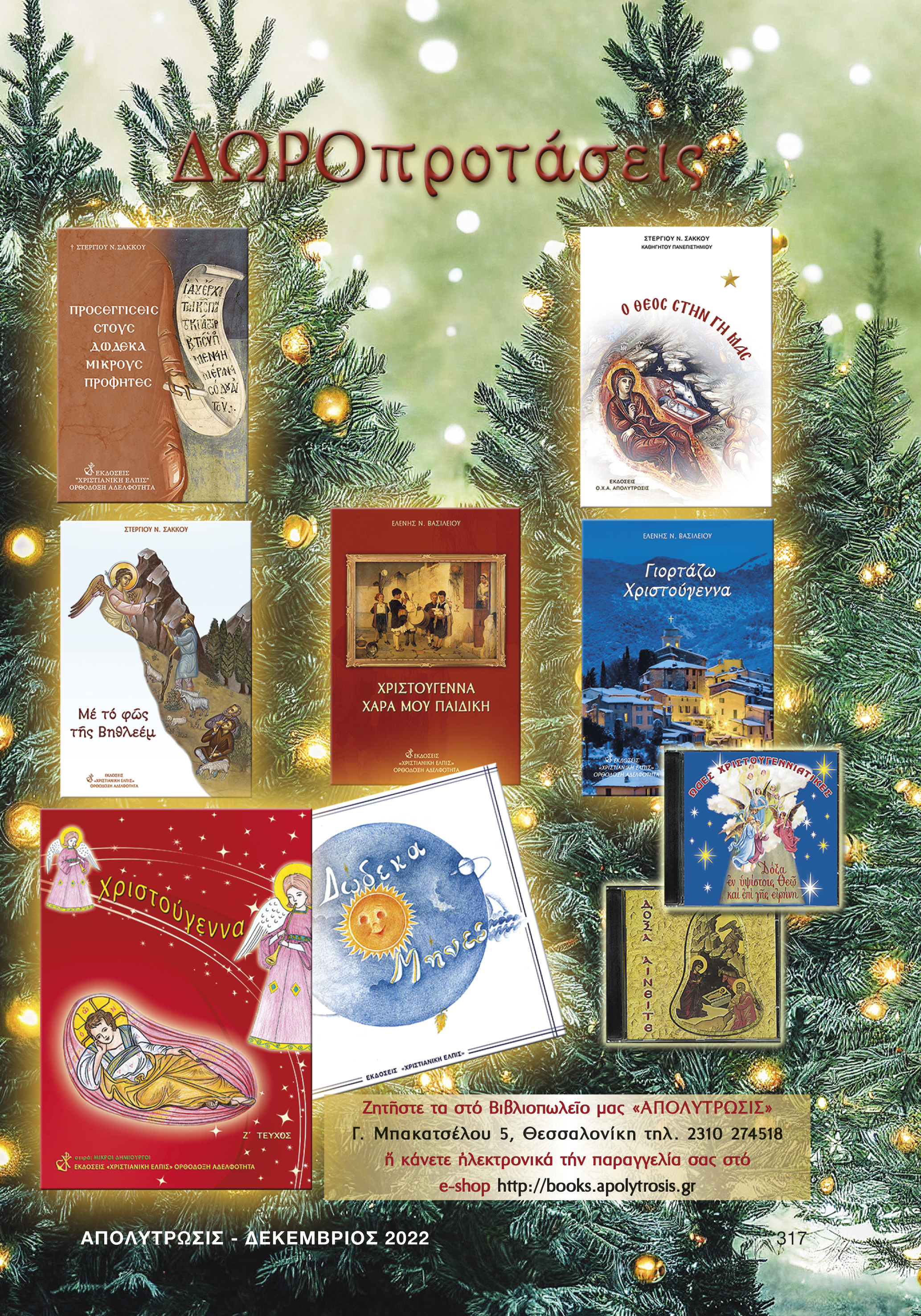 ΑΠΟΛΥΤΡΩΣΙΣ
ΧΡΙΣΤΙΑΝΙΚΗ ΟΡΘΟΔΟΞΗ ΑΔΕΛΦΟΤΗΣ
ΑΠΟΛΥΤΡΩΣΙΣ
ΧΡΙΣΤΙΑΝΙΚΗ ΟΡΘΟΔΟΞΗ ΑΔΕΛΦΟΤΗΣ
Super User
ΕΟΡΤΑΣΜΟΣ ΑΝΑΛΗΨΕΩΣ
 ΙΕΡΟΣ ΝΑΟΣ ΑΝΑΛΗΨΕΩΣ ΤΟΥ ΣΩΤΗΡΟΣ
ΙΕΡΟΣ ΝΑΟΣ ΑΝΑΛΗΨΕΩΣ ΤΟΥ ΣΩΤΗΡΟΣ
(ΟΡΘ. ΑΔΕΛΦΟΤΗΤΑ "ΧΡΙΣΤΙΑΝΙΚΗ ΕΛΠΙΣ")
ΦΙΛΥΡΟ ΘΕΣ/ΝΙΚΗΣ
Τετάρτη 28 Μαΐου
6.40 μ.μ. Ἀπόδοση τοῦ Πάσχα
7.00 μ.μ. Ἑσπερινός Ἀναλήψεως
Πέμπτη 29 Μαΐου
7.00 π.μ. Ὄρθρος, Ἀρχιερατική Θεία Λειτουργία
χοροστατοῦντος τοῦ Σεβασμιωτάτου Μητροπολίτου
Νεαπόλεως καί Σταυρουπόλεως κ. Βαρνάβα.
St. John the Chrysostom as a Pedagogue (3)
Dr Despoina M. Kalogeraki, Bth, Mth, PhD
The Purpose of Agogi (Upbringing/Education)
 The purpose of Christian agogi, according to St. Chrysostom is the act of shaping a child into an icon of God1. Thus, he exhorts the parents “to raise their children” as if they were raising “athletes in Christ”. He counsels them that though they live in the world (Gk κόσμος) they should teach their children το be pious from their first steps2.
The purpose of Christian agogi, according to St. Chrysostom is the act of shaping a child into an icon of God1. Thus, he exhorts the parents “to raise their children” as if they were raising “athletes in Christ”. He counsels them that though they live in the world (Gk κόσμος) they should teach their children το be pious from their first steps2.
The purpose of Christian pedagogy is not secular and “from this world” (Jn 18, 36)· it is rather “Christocentic”, not man-centric but Godman-centric (as Jesus Christ who has two natures, human and divine)3. Thus, it goes without saying that the core of the pedagogy of St. Chrysostom has long-lasting power as it is derived from the divinely inspired Scriptures, the Word of God. That is why referring to a disciple he notes, “even if you have not a teacher to follow his advice you have Jesus’ Christ advice to follow… He is the perfect teacher to obey to”4.
The enlightened father of the Church teaches that as the first human being was created according to the “image” of God (Gen 12:6), likewise every child that is conceived, bears the imprint of God on its soul. It is actually an image of God. This image however, was injured by sin. This injury is now to be healed by the pedagogy in Christ. A pedagogue’s ultimate purpose is to lead his disciples off any kind of sin. Thus, as we have already noted above, its value is priceless.
Furthermore, it goes without saying that a pedagogue is not capable of intervening in the process of the creation of God as it is utterly God’s work. He can however, affect the willingness of a man in order to help him act according to God’s commandments. For, human’s soul “is not bad or good by nature”, on its own. To the contrary, one’s good or bad will makes a person a good or a bad human being5. Thus, the pedagogue, either a parent or a teacher, tries to cultivate children’s will and teach them to abstain from every kind of sin. And, as St. Chrysostom points out, this is where the great responsibility lies. So, it seems that with the proper education-pedagogy, nature is to be overcome6.
Undoubtedly, St. Chrysostom has stressed the pedagogical role of both parents and family as a whole7. What makes somebody a father or a mother, he points out, is not only to give life to their children but to raise them in the proper way, namely in Christ8. Hence, parents have to transform their families to an “ecclesia=church” (Gk ἐκκλησία), which means a gathering of the faithful to worship God. In doing so, “fathers and mothers, by bringing up their children shall not lose their reward”9, he notes. He also develops what we would call today “parental counseling”10 underlining how much the sentimental environment affects the upbringing of children. One cannot expect much when a family resembles to “a ship, while being in a storm, the captain is arguing with the officer at the bow”11. For Chrysostom, marital life and upbringing of children is actually a kind of “a science”12.
...........................
1.PG 62, 154. See also V. Tatakis, Studies on Christian philosophy, ed. Papadimirtiou, Athens 1967.
2. “About vanity and how…, par. 19.
3. See Eph 4, 13.
4. “Have you a teacher who is not virtuous? Still you have Him who is truly a Teacher, whom alone you should call a Teacher. Learn from Him: He has said, “Learn of Me, for I am meek.” (Matt. 11, 29.) Do not take heed, then, to your teacher, but to Him and to His lessons. Take thence thy examples, you have a most excellent model, to it conform yourself”. On Philippians, PG 62, 273. See Heb 12, 2.
5. On Thessalonians 2,4· PG 62, 478.
6. See also, About children’ upbringing, PG 63, 767.
7. “…fathers may be benefited by the virtue of their children, and mothers also, when they have brought them up well. But what if she be herself addicted to wickedness and vice? Will she then be benefited by the bringing up of children? Is it not probable that she will bring them up to be like herself? It is not therefore of any woman, but of the virtuous woman, that it is said she shall receive a great recompense for this also”. See On first letter to Timothy, PG 62, 547 .
8. Just like Anna raised Samuel. See To Anna…, Logos A΄, PG 54, 652-660. See also, On Maccabees…, Homily I, PG 50, 621 See also, To a widow…, PG 51, 329.
9. Ibid.
10. On Ephesians, Homily XX, PG 62, 146-148.
11. On first letter to Corinthians, PG 61, 153.
12. On first letter to Timothy, Homily IX, PG 62, 547.
Copyright © 2021 by Orthodox Christian Association «ΧΡΙΣΤΙΑΝΙΚΗ ΕΛΠΙΣ» ΟΡΘΟΔΟΞΗ ΑΔΕΛΦΟΤΗΤΑ. Used by permission. All rights reserved.
On the Way to Emmaus (Resurrection)
Translation from the Book
Ὁ Θεός στήν ἱστορία τῆς Ἐκκλησίας, Βοήθημα Κατωτέρου Κατηχητικοῦ Γ΄,
ἐκδ. «Χριστιανική Ἐλπίς» Ὀρθόδοξη Ἀδελφότητα, Θεσσαλονίκη 2016, σσ. 159-163
Have you ever seen a desperate man? It’s easy to tell them apart because of their gloomy face and the way they struggle to talk or walk.
Miserable and disappointed two of Christ’s students were walking towards their village named Emmaus. They were walking slowly because they felt their legs heavy but their heart was heavier. For a long time they were silent. After a while they started discussing something but they were whispering as if they were afraid to be overheard. They were talking about their teacher, Jesus, Whom the teachers of the Law and the archpriests arrested, judged, and condemned to death by crucifixion overnight. These events had caused them great pain and were the reason for their gloom.
At some point they heard footsteps behind them. They turned around and saw a Stranger walking. In a minute he caught up with them and was walking beside them.
- What are you discussing that makes you look so sad?
- What else? The events of the past few days.
- Which events?
- Have you not heard what happened in Jerusalem these days? Haven’t you heard of Jesus from Nazareth? No prophet has ever spoken as He did. His words filled our hearts with strength, light, and joy! No one has done such great miracles! He made blind people see and paralyzed people walk, He cured lepers and brought dead people back to life. He even resurrected Lazarus in Bethany, who had been in the tomb for four days!
- Nevertheless, the archpriests and the rulers arrested Him secretly at night, sentenced Him and crucified Him! We hoped that he was Jesus the Messiah, our savior. Now our dreams are ruined and our hopes are dead!
- Today is the third day since all that happened. Some women of His disciples startled us early in the morning. They had gone to his tomb to offer their myrrh but they didn’t find His body! They supposedly saw angels who told them that He lives.
- Some of His disciples run to the tomb and found it empty. We no longer hope to see Him again.
Then the Stranger spoke.
- How slow you are in mind and heart! Why didn’t you think that in this way the prophecies are fulfilled? Shouldn’t the Messiah suffer before he was glorified?
He began explaining the prophecies of the Old Testament about the Messiah. His words soothed their pain and gave them strength.
- But I must leave you now. I’m going farther. 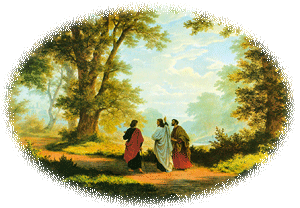 They were close to their village. What a pity! They didn’t want to part ways with Him! They started pleading: “Stay with us!”. They tried to find a reason or a solid argument to keep Him around.
They were close to their village. What a pity! They didn’t want to part ways with Him! They started pleading: “Stay with us!”. They tried to find a reason or a solid argument to keep Him around.
- It’s getting dark, stay with us!
- We will put you up, stay with us!
- Your words helped us relax, you consoled us, stay with us!
They said it several times: “Please, stay with us!”. The Stranger accepted their offer to stay in their place.
The two students were really happy! They set the table to offer Him a meal. Although they couldn’t explain it, they felt so nice in the company of that Stranger. The pain and melancholy that pressed their heart were gone. Before they started eating the Stranger took the bread, blessed it and divided it. There was something familiar in His movements. Who else used to bless the bread and divide it that way?
Then their eyes were opened and they recognized Him; it was Jesus, their beloved teacher! How did they not realize it sooner? They felt a light, a fire in their heart as He was talking to them!
They couldn’t tell any of those thoughts to their teacher because he vanished. He was resurrected so he could appear and disappear whenever He wanted.
They two students immediately set off to return to Jerusalem. Now they weren’t walking slowly with heavy legs. Now they were running! Their faces were glowing of happiness. They wanted to meet the other students and tell them that Christ had really risen and they had seen Him!
Stay with us
This is the great truth, our Christ has risen and the Christians can’t help spreading the word. The Resurrection assures us that Christ, who had the power to come back to life from the dead, is the real God! After Easter and until the celebration of Ascension the Christians greet each other with the words:
- Christ is risen!
- Indeed He is risen!
There is no greater joy; our most feared enemy Death is dead! The resurrected Christ is beside us all the time.
In order for Christ to stay at our side, we need to ask Him. He is the kindest and most polite visitor. He comes close only if we ask Him to. Remember the two students who pleaded “Stay with us!”. They said it many times and they meant it because they didn’t want to be deprived of His company. It’s a sweet prayer which we can say all the time:
• on the way to our school or job
• when we study
• before we fall asleep at night
• when we pray
• whenever something bothers us
• when our family deals with a serious problem
• when our country faces difficulties or dangers
We should insistently ask Christ to stay with us and then we will enjoy His sweet company.
I have nothing to fear when almighty Christ is near!
Your presence, Christ, beside me is my safety and joy!
Copyright © 2021 by Orthodox Christian Association «ΧΡΙΣΤΙΑΝΙΚΗ ΕΛΠΙΣ» ΟΡΘΟΔΟΞΗ ΑΔΕΛΦΟΤΗΤΑ. All rights reserved.
St. John the Chrysostom as a Pedagogue (2)
Dr Despoina M. Kalogeraki, Bth, Mth, PhD
The Value of Pedagogy
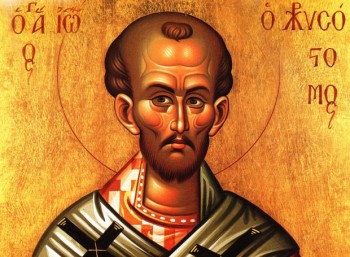 Pedagogy for the eminent father of the 4th century, is “an art above all arts” and “a science superior to all other”1. Every art is useful and every piece of knowledge is necessary. Nevertheless, to know how to form young people’ soul is the ultimate task. If a coppersmith or a goldsmith, St. Chrysostom explains, fashion their pots and vessels with great effort, the teacher, “has a far mightier craft (than theirs)”, namely, “he is beating into shape not vessels of gold, but the soul, which is more precious than all gold, even as the smith hammers out his vessel. For it is no material vessel that he is working at, but he is freeing their soul from all imaginations belonging to this life”2.
Pedagogy for the eminent father of the 4th century, is “an art above all arts” and “a science superior to all other”1. Every art is useful and every piece of knowledge is necessary. Nevertheless, to know how to form young people’ soul is the ultimate task. If a coppersmith or a goldsmith, St. Chrysostom explains, fashion their pots and vessels with great effort, the teacher, “has a far mightier craft (than theirs)”, namely, “he is beating into shape not vessels of gold, but the soul, which is more precious than all gold, even as the smith hammers out his vessel. For it is no material vessel that he is working at, but he is freeing their soul from all imaginations belonging to this life”2.
Moreover, the work of a pedagogue is greater than the work of even, a king. For, the latter is in charge of ruling his town with justice, but the former is expected to lead the soul of youth, which happens to be not an ordinary town but a “golden town”3. Thus, the fact that the soul of a child is a “golden town”, makes the work of a pedagogue valuable and superior to all other professions. Besides, St. Chrysostom exhorts us, “you should consider everything of secondary importance in relation to the care of children”4. For, if we managed to solve all social problems but we failed to solve the issue concerning the pedagogy of children, we would succeed nothing. On the contrary, if we managed to take care of the upbringing of our children, there would be no unsolved problem5. Thus, for St. Chrysostom, the value of the agogi is as much as the value of the soul· and, needless to say, there is nothing equal to soul. For, it is written, “what will it profit (us) if (we) gain the whole world but forfeit (our) life? Or what will (we) give in return for (our) life?” (see Matt 16:26)6.
At this point we should point out what we have already mentioned above namely, the fact that the basis of St. Chrysostom’s pedagogy is his theology. The prototype of the “good and virtuous” (Gk καλός κἀγαθός)7 that was set forth when John Chrysostom studied in Athens near famous teachers and philosophers, who happen to be idolaters, was not enough for him8. Ηis pedagogical ideas were not limited to the human categories. The task of agogi becomes priceless when one acknowledges the value of human life, the value of humans’ soul. Having as starting point that “humans are an icon of God”9 and they are worthy of honor “more than anything in God’s creation”10, Chrysostom as an anthropologist, underlines both the greatness and at the same time, the tragedy of human nature. He teaches that human nature can only be comprehended if proper attention to its origin is to be paid. All humans are God’s live icons. And among all people, children represent “the great legacy”11 that humans have. Hence, the task of pedagogy is the highest one· in Chrysostom’s words, “the art of the arts”12.
.................................................
1. “For teaching (ruling spiritually) is an art, not merely a dignity, and an art above all arts. For if the rule of those without is an art and science superior to all other, much more this. For this rule is as much better than that, as that than the rest· rather, even much more”. See, On Corinthians, PG 61, 506· See also, St. Sakkos, “The art of the arts”Pedagogical courses by St. John Chrysostom, ed. Christianiki Elpida, Thessaloniki 2014.
2. On Acts, PG 60, 204.
3. About vanity and how are the parents supposed to raise their children 54, ΕΠΕ 30, 674.
4. On Ephesians, PG 62, 151.
5. Chrysostom, On Ephesians, PG 62, 151.
6. It has to be noted that in this article the NSRV edition of the Bible is to be followed.
7. See M. Siotis, Christianity and Humanism, Athens 1969.
8. The use of the phrase “καλόςκἀγαθός” is attested since Herodotus and the classical period. The phrase is adjectival, composed of two adjectives, καλός (beautiful) and ἀγαθός (good in the sense of virtuous), the second of which is combined by crasis with καί (and) to form κἀγαθός. There is thematic discussion of kalokagathia (καλοκαγαθία noun) in Aristotle’s Eudemian Ethics (Book VIII, ch. 3 (1248b).
9. “For if men for making statues and painting portraits of kings enjoy so great honor, shall not we who adorn the image of the King of kings, (for man is the image of God,) receive ten thousand blessings, if we effect a true likeness?”. See, On Ephesians, PG 62, 154.
10. On the Gospel of John, ΕΠΕ 14, 32.
11. On Ephesians, PG 62, 546.
12. On Corinthians, PG 61, 506.
Copyright © 2021 by Orthodox Christian Association «ΧΡΙΣΤΙΑΝΙΚΗ ΕΛΠΙΣ» ΟΡΘΟΔΟΞΗ ΑΔΕΛΦΟΤΗΤΑ. Used by permission. All rights reserved.
Biography of Saint Cyril of Jerusalem
From the Book
The Catechetical Homilies of St. Cyril Archbishop of Jerusalem
Edited by Despoina M. Kalogeraki, Ph.D.
Published by Orthodox Missionary Fraternity of Thessaloniki
Thessaloniki 2011
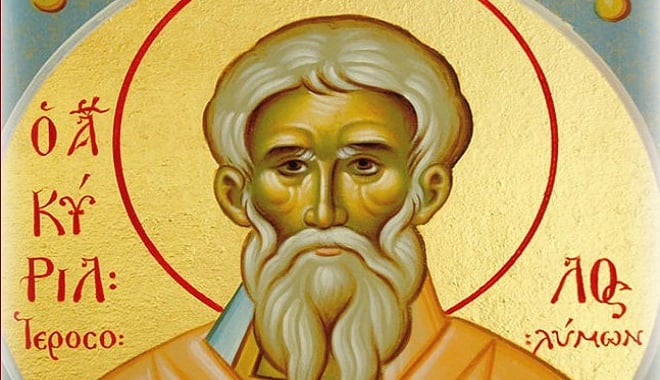 St. Cyril, bishop of Jerusalem and one of the “Fathers of the Church”, was born most probably in Jerusalem about 316 A.D, just about the time the emperor Constantine legalized Christianity in the Roman Empire (313 A.D.) and reposed in peace probably 18 March 386 A.D, shortly after the Second Ecumenical Council of Constantinople (381 A.D) which completed the Creed often known as the Nicene Creed. In the East his feast is observed on the 18th of March. Little is known of his life. We gather information concerning him from his younger contemporaries, Epiphanius, Jerome and Rufinus, as well as from the fifth-century historians, Socrates, Sozomen and Theodoret.
St. Cyril, bishop of Jerusalem and one of the “Fathers of the Church”, was born most probably in Jerusalem about 316 A.D, just about the time the emperor Constantine legalized Christianity in the Roman Empire (313 A.D.) and reposed in peace probably 18 March 386 A.D, shortly after the Second Ecumenical Council of Constantinople (381 A.D) which completed the Creed often known as the Nicene Creed. In the East his feast is observed on the 18th of March. Little is known of his life. We gather information concerning him from his younger contemporaries, Epiphanius, Jerome and Rufinus, as well as from the fifth-century historians, Socrates, Sozomen and Theodoret.
He spent his whole life in Jerusalem where was consecrated bishop of the Holy City of David about 348 A.D by Acacius of Caesarea. St Cyril was banished from his Jerusalem see a total of three times for his bold proclamation of faith in Christ’s full divinity during a time when many bishops and emperors were in favour of various forms of the Arian1 heresy. Being zealous for the Orthodox faith, he was exiled three times by the Arian Emperors Constantius and Valens.
St. Cyril attended the great Council of Constantinople in 381 A.D, the Second Ecumenical Council, at which Theodosius ordered the Nicene faith (the one of the First Ecumenical Council of Nicaea in 325 A.D), now a law of the empire, to be promulgated. According to the Second Council of Constantinople Cyril proved himself to be one of the greatest fighters against Arianism.
The extant works2 of St. Cyril of Jerusalem include a sermon on the Pool of Bethesda, a letter to the emperor Constantius describing a wonderful cross of light extending from Golgotha to the Mount of Olives, a cross which appeared in the air during the celebration of Pentecost in 351 A.D, four small fragments of other homilies of his, and the famous “Catecheses”, which are presented in this book and which are among the most precious remains of Christian antiquity.
............................
1. Arianism is the theological teaching of Arius (250-336 A.D.), a Church priest, who was deemed a heretic at the First Ecumenical Council of Nicaea in 325 A.D. and pronounced a heretic again after his death at the Second Ecumenical Council of Constantinople in 381 A.D. According to the heretic Arius, God the Father and the Son did not exist together eternally. The Son was not God himself but he was created by the Father in time.
2. See Patrologia Graeca 33, 331-1180.
Copyright © 2021 by Orthodox Christian Association «ΧΡΙΣΤΙΑΝΙΚΗ ΕΛΠΙΣ» ΟΡΘΟΔΟΞΗ ΑΔΕΛΦΟΤΗΤΑ. Used by permission. All rights reserved.
St. John the Chrysostom as a Pedagogue (1)
Dr Despoina M. Kalogeraki, Bth, Mth, PhD
 It is a fact that St. Chrysostom, “the great ecumenical teacher”, as the Orthodox Church chants, has not written a, let us say, systematic pedagogical piece of work, in the strict sense of the word. However, if we were to study his hermeneutical works thoroughly, we would gather a treasure of teaching elements about pedagogy (Gk παιδαγωγία). He actually belongs to the chorus of founders of Christian pedagogy. Since his pedagogy is being based on theology, it has undoubtedly a timeless value. St. Chrysostom was not a philosopher1. On the contrary, he was a theologian whose teaching was first and foremost, a living experience. It is said that St. Chrysostom was the stubborn champion of assiduous Bible reading, even among the laity. This very fact makes his pedagogical principles part of his theology.
It is a fact that St. Chrysostom, “the great ecumenical teacher”, as the Orthodox Church chants, has not written a, let us say, systematic pedagogical piece of work, in the strict sense of the word. However, if we were to study his hermeneutical works thoroughly, we would gather a treasure of teaching elements about pedagogy (Gk παιδαγωγία). He actually belongs to the chorus of founders of Christian pedagogy. Since his pedagogy is being based on theology, it has undoubtedly a timeless value. St. Chrysostom was not a philosopher1. On the contrary, he was a theologian whose teaching was first and foremost, a living experience. It is said that St. Chrysostom was the stubborn champion of assiduous Bible reading, even among the laity. This very fact makes his pedagogical principles part of his theology.
Being an eminent pedagogue and, as a matter of fact, excellent connoisseur of human psychology2, St. Chrysostom with his teaching has introduced a timeless, integrated pedagogical system.
The period that Chrysostom lived (344/354-407), was a rather difficult time in many aspects. That is why Christian teaching was accepted by people from every social class. During this very period, spiritual fathers of the Church, apart from St. John Chrysostom, having as a starting point the teaching of the Holy Scripture and simultaneously, based on the Holy Tradition (Gk Παράδοσις)3, have studied fundamental issues of the education (Gk ἀγωγή “agogi” meaning the act of leading), in other words, issues concerning pedagogy (Gk παιδαγωγία meaning leading young people-παῖδες- by teaching). Thus, the foundation of what we call “Christian pedagogy”4 has been laid by a number of Christian teachers of that period.
All these enlightened teachers were inspired by the teaching of the foremost teacher, the Lord Jesus Christ Himself. We also have to mention the pedagogical concepts of St. Paul5 who was the most eminent pedagogue in Christ (Gk ἐν Χριστῷ), as well. His teaching exemplifies the connection and interdependence between theology and pedagogy in Christ. For, as St. Paul confesses “it is no longer I who live, but it is Christ who lives in me” (Gal 2:20)6. Thus, he is the one who embodies the teaching of Jesus Christ the Teacher and our Savior.
Let us briefly refer to the pedagogical works of the teachers of the first Christian centuries, during which fathers of the Church have actually formed the pedagogical system of the Church. It has been accurately said that Christianity is a “religion of pedagogy”7. I esteem that it is a very proper characterization as its ultimate goal is to lead all people who are God’s children, to their final destination, namely near God. For, God “desires everyone to be saved and to come to the knowledge of the truth (1Tim 2, 4).
Moreover, during that “golden” period of the history of the Christian Church, there were people who have written relative works. Firstly, Clement of Alexandria (2nd century), has written the “Pedagogue”8, Basil the Great (+379), John Chrysostom (+407), as an ecclesiastical teacher and preacher at the same time9, Jerome (+420) and St. Augustine (+430). Additionally, St. Cyril of Jerusalem (+386) has written the Catecheses10, St. Gregory of Nyssa (+394) and Kassianos the Roman (end of the 4th century)11 as well. All the above mentioned, have put together the axioms that form the Christian pedagogy, which is not a secular approach to the issue of counseling young people but an approach through the prism of Christian theology. These axioms and principles stay unchanged in our spiritual tradition and remain valid till today. Contemporary teachers, ascetics like St. Prorfyrius, Paisius the Athonite, Sofronios of Essex and many others have continued to espouse and underscore the principles of pedagogy that have been laid on the basis of Orthodox theology.
Specifically, the pedagogical and phycological principles of the teaching of St. Chrysostom, are embedded in many of his pieces of work12 but there are some of them that would be of special interest to our subject matter13. Namely, homily “to a widow must be said that…”, homily “to Anna…”, homily 21st “on Ephesians”, homily 9th “on the first letter to Timothy”, homily 27th “about children’ upbringing”, Logos 3nd “to a faithful father”, homily 21st “on the Gospel of Matthew” and homily “About vanity and how are parents supposed to raise up their children”14.
Let us have a look at some of John Chrysostom’s fundamental pedagogical ideas. We will explore some ideas concerning the value and the purpose of “agogi” and the profile of a pedagogue as well, according to Chrysostom’s pedagogical system. Examining these aspects of St. Chrysostom’s pedagogical ideas, we will witness the interrelation between theology and pedagogy in his thought.
....................................
1. As he actually notes in his exegesis “you teach by words? But this is easy, to philosophize in words: teach me by your life· that is the best teaching. You say that it is right to be moderate, and you make a long speech about this thing, and play the orator, pouring forth your eloquence without a check?” St. Chrysostom, On Acts, Homily XXX.
2. A. Danassis, Johannes Chrysostomos, Pädagogisch – Pshychologische Ideen in seinem Werk, PhD work, Bonn, 1971, Bouvier Verlag Herbert Grundmann. Also, see S. Seidlmayer, Die Pädagogik des Johannes Chrysostomus, München, 1923, Münster, 1926.
3. Gk ἹεράΠαράδοσις, meaning the teaching of the Holy Scripture as it is interpreted by the very life of the Church. There are four main sources, the Word of God laid down in the Holy Scripture, the definitions of the Councils, the liturgical texts and the writings of the Fathers. For the Orthodox Church, the Holy Scripture on the one hand and the Holy Paradosis (tradition) on the other are the two pillars of its faith.
4. J. Kogoulis, Catechetical and Christian Pedagogy, ed. Kyriakidis, Thessaloniki 1990.
5. A. Mpitsakis, The education of man according to St. Paul, ed. Gregory, Athens 1968
6. References from the Bible, as well as abbreviations of them (see pp. xxvii-xxviii) follow New Standard Revised Version of the Bible.
7. D. Moraitis, Pedagogical ideas of the three Hierarchs, ed. Gregory, Athens 1968.
8. Clement of Alexandria, All works, The Pedagogue, 1 EΠΕ, 112, ed. “Gr. Palamas”, 1992.
9. See P. Mpratsiotis, The revival of the Three Hierarchs through the centruries, ed. Ap. Diakonia, Athens 1972.
10. St. Cyril of Jerusalem, Catecheses, ed. “Etoimasia”, Kareas 1991.
11. Abbas Kassianos, Talking with the fathers of the desert, ed. “Etoimasia”, Kareas 2004 (vol. A), 2006 (vol. B).
12. See bibliography
13. For the English translation in this article, Philip Schaff’s translation is followed wherever necessary.
14. Concerning this homily there is a dispute among the interpreters with regard to its fraternity. See D. Moraitis, John Chrysostom’s pedagogy, About vanity and how are the parents supposed to raise their children, Library “Papyrus”, n. 96, Athens 1940. With regard to the fraternity issue see pp. 3-20.
Copyright © 2021 by Orthodox Christian Association «ΧΡΙΣΤΙΑΝΙΚΗ ΕΛΠΙΣ» ΟΡΘΟΔΟΞΗ ΑΔΕΛΦΟΤΗΤΑ. Used by permission. All rights reserved.
The Death of St. John the Baptist
Translation from the Book
Ὁ Θεός στήν Καινή Διαθήκη, Βοήθημα Κατωτέρου Κατηχητικοῦ Β΄,
ἐκδ. «Χριστιανική Ἐλπίς» Ὀρθόδοξη Ἀδελφότητα, Θεσσαλονίκη 2015, σσ. 102-107
Mt 14:1-12
Do you know who is the greatest man of all ages? Among women, it is Virgin Mary, the Mother of God. Among men it is Saint John the Baptist. He is so great that Christ himself praised him! He is the greatest prophet, the one who pointed to Christ with his hand and was worthy of baptizing Him in the Jordan River. He is the greatest (askitis) monk, who lived for many years in the desert with strict fasting and prayer. He had such an ascetic life that he is presented as an angel in the icons.
This great man lost his life - not just died but he had a horrible martyrdom - because of a dance. You all know Herod, the king, who slaughtered the infants of Bethlehem, because he feared the newborn Jesus. This Herod had a son who, after his father’s death, became a King and was called Herod the tetrarch.
The new king was not at all a good example for his people. His life was covered in sin and immorality. He had even taken his brother’s wife, named Herodias. This was too immoral and illegal! But no one dared to speak to the king about this dishonesty. Everyone wanted to be on good terms with him. All? Only one dared to raise his voice without fear. And this was John the Baptist. "King," he told him, "it is not lawful for you to have her!"
And what did the king do? Did he realize his mistake? Did he regret it? No! Instead, he sent soldiers to arrest John and threw him into a dark prison. He would also wish to kill him, but he was afraid that the people who loved John, might revolt against him. So, in the prison of Machairous, the most courageous and holy person was rotting away.
But even from prison John did not stop criticizing the immoral Herod: "King! You are not allowed to do what you do". Herodias, his illegitimate wife, however, was disturbed by John’s criticism more than Herod himself. She could not bear to hear the voice of John the Baptist. She wanted to get him out of the way. “How dare he speak such words about the royal couple!” So, she was looking for an opportunity to get rid of him and the opportunity soon appeared.
On the day Herod had his birthday, he invited all the officials of the area for a feast. So, when everyone had started getting drunk, they were left speechless by an impressive spectacle: A young girl, Salome, showed up. She was the daughter of Herodias. She was provocatively dressed, loaded with jewelry and excessive make-up and she started dancing in a very sinful way.
But the half-drunk Herod, instead of being ashamed, was proud of her. As soon as the dance was over, blinded by drunkenness, he called her close to him and said: "Ask me what you wish! I will give you up to half of my kingdom!".
What should Salome ask for? She ran and asked her mother, the wicked Herodias. Here was the opportunity she was waiting for! There was no need for her to think much about it. She advised her daughter “You will ask for John's head on a platter”! Salome without wasting a moment ran into the dining hall and while the food was being served to the guests, she asked for John's head on a platter!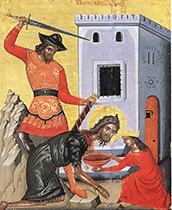 Did the king hear well? Did she ask for John's head? Yes! Herod, as he had sworn in front of his guests that he would give Salome whatever she would ask for, gave the order. Ηe sent his soldier to behead John in the prison. Since then, king Herod had not been able to calm down. Saint John was no longer alive but his name created remorse and fear to the King. He feared that one day he would be resurrected and avenge his death.
Did the king hear well? Did she ask for John's head? Yes! Herod, as he had sworn in front of his guests that he would give Salome whatever she would ask for, gave the order. Ηe sent his soldier to behead John in the prison. Since then, king Herod had not been able to calm down. Saint John was no longer alive but his name created remorse and fear to the King. He feared that one day he would be resurrected and avenge his death.
In Orthodox Church there is a period called "Triodion". During this period, the Church invites us to prepare ourselves with prayer and fasting to welcome the great days of the Passion and the Resurrection of our Lord Jesus Christ. On the contrary, what do many people do these days? They go to parties and feasts. Various clubs, associations and schools organize their annual dance during this period. In many cities, during these days of the Triodion, the carnival is celebrated with various events and parades of the masked people.
a. In the dances that take place during this period, people are used to masquerading. Masquerade parties are held. And what is wrong with that? This custom starts from an infamous pagan custom. The history of masquerade has its roots in ancient times, when people worshiped the god Dionysus with drunkenness and masquerading. Hiding behind a mask, they could commit any sin they would otherwise be ashamed to commit.
b. The beautiful dances of our homeland have grace and cultural value. Do they dance in this way at masquerade parties? Unfortunately, no! Other dances that are foreign, furious and provocative. Some of them reminds us of Salome’s dancing! People get used to them, of course, because they watch them on screens. But, what we watch on TV is not always right and moral.
c. When people get drunk, they do not know what they are doing. They usually do things they later regret. All their sinful desires awaken in their drunkenness and they are unable to resist. They willingly give in to what is wicked and sinful. Remember Herod! He did not hesitate, drunk as he was, to hand over, to that corrupt girl, the head of the greatest Saint on a platter!
It is helpful to know all these, now that you are still young, so that as you grow older you can keep yourselves safe. Christ wants his children to rejoice, but with genuine joy! And there are, indeed, so many ways to have fun and rejoice in the pure, true joy of our Christ! For example, in Christian summer camps you can find: games, dances, great fun, endless joy ... In this way, "entertainment" guides our soul in a correct path and raises it higher and higher!
Please Lord, give me strength to resist to any kind of fun that is sinful.
Copyright © 2021 by Orthodox Christian Association «ΧΡΙΣΤΙΑΝΙΚΗ ΕΛΠΙΣ» ΟΡΘΟΔΟΞΗ ΑΔΕΛΦΟΤΗΤΑ. All rights reserved.
The Healing of the Centurion's Servant
Translation from the Book
Ὁ Θεός στήν Καινή Διαθήκη, Βοήθημα Κατωτέρου Κατηχητικοῦ Β΄,
ἐκδ. «Χριστιανική Ἐλπίς» Ὀρθόδοξη Ἀδελφότητα, Θεσσαλονίκη 2015, σσ. 46-50
All children feel happy when parents go to school to check on their progress and they get praised. They feel happy when the teachers say how well they do at class and how well-behaved they are. Imagine how much happier we all would feel if we got praised not by any man but by Christ Himself!
Our Lord Jesus Christ started his public ministry in Capernaum. That's where he spoke highly of a Roman army officer in front of the crowds that followed Him. “He surpasses all Israelites” Jesus said! What did He see in that man that caused His admiration?
Upon Jesus entering the city of Capernaum, a centurion approached Him. At that time a centurion in the Roman army was like a captain, who commanded a force of a hundred soldiers. There were a lot of Roman soldiers in Palestine because it was a region conquered by the Romans.
What could a centurion possibly want from Christ? Was he suffering from a disease and therefore needed His help? Christ had already been widely known for His miracles. The news about Him were spreading fast, His reputation was constantly growing. Everyone was talking about how He had healed a lot of people with serious illnesses.
No, the centurion didn't come to Christ to help himself. He was asking Him for something, he was even begging, but not for a personal problem. That is what he was pleading about: “Lord, my servant has fallen seriously ill. He lies at home paralyzed and he is suffering terribly.”
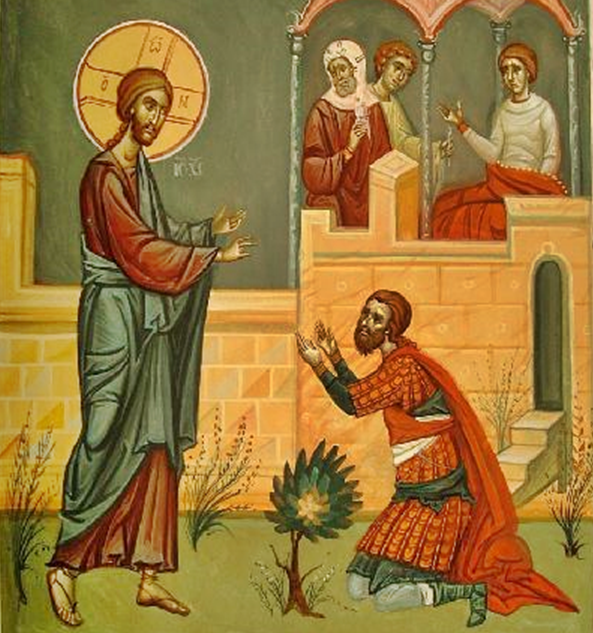 Everyone was surprised. A centurion was pleading on behalf of his servant! Servants were deprived of freedom and human rights. The only purpose of their existence was to serve their masters by working hard all day long. They were considered to be their masters' property that could be sold or mistreated. A master had the right to kill his servants if they got sick or caused trouble, like people did with their livestock.
Everyone was surprised. A centurion was pleading on behalf of his servant! Servants were deprived of freedom and human rights. The only purpose of their existence was to serve their masters by working hard all day long. They were considered to be their masters' property that could be sold or mistreated. A master had the right to kill his servants if they got sick or caused trouble, like people did with their livestock.
This is why everyone was astonished by the centurion's imploring words for his servant. Christ was the only one that wasn't stunned, since He saw so much love in that man's heart. The centurion loved and cared for everyone, even the pitiful servants. He felt compassion for his servant who was suffering, ready to die.
“I will come and heal him” our Lord assured the centurion. It was impossible to deny to a man with so much love and kindness. The centurion's eyes sparkled with joy and gratitude. But why did he look hesitant? What was bothering him?
Apart from love, the centurion's heart was filled with humility. Although he was in the high ranks of the Roman army, he didn't think high of himself, he wasn't arrogant. “Lord”, he said humbly to our Christ, “I'm not worthy of your coming under my roof”. He believed he didn't deserve to receive the holy Teacher in his house!
How could Christ heal his servant then? We admired his love. We also admired his modesty. But what deserves our greatest admiration is his faith. “My Lord” he told Him with complete confidence “Just say a word and my servant will be healed. For I myself obey the officers who are over me, and I give orders to my soldiers. I tell this one, 'Go' and he goes, and that one 'Come' and he comes. I say to my servant 'Do this' and he does it.”
What great faith was hidden behind those words! He believed that Christ could heal his paralyzed servant, who couldn't even get out of bed, just with one word from afar! How could Christ disregard these words and not praise him? He declared in front of the crowd: “Truly I tell you, not even among Israelites have I found such great faith....” Then he turned to the faithful centurion and said: “Go and let it be done, just as you believed it would”. So, what the centurion believed with all his heart happened. At that moment his servant was healed!
The three great virtues of the soul
The centurion didn't earn Christ's admiration because of his rank. Christ admired him for the virtues of his soul. Three bright stars adorned him like medals:
a) Love
How did he express his love? He did it by showing interest in his servant's health. He took the trouble to come and meet Christ, to beg Him for his servant's problem, even though servants were underrated. Is our soul adorned with love? Or do we only care about ourselves and our problems? Christ likes it so much when He sees us care for others.
♦ At home. Does mother need any help? We could make it easier for her by doing the shopping or taking care of little brothers and sisters.
♦ At school. Could we be of use to our classmates in case they have difficulties with their schoolwork? Some of our classmates might be in need of things we have plenty and could share.
♦ Relatives or neighbours. Is anyone sick and needs someone to keep them company? Our grandparents, who live alone, would be happy if we visited them!
We can think of many ways to show our love. Christ will be so happy for us!
b) Modesty
What does modesty mean?
♦ Not to brag about our talents and abilities.
♦ Not to think that the others are inferior to us.
♦ Not to get stubborn and all things to be done our way.
A child who is modest
♦ Can comply
♦ Speaks politely to everyone
♦ He thinks that everything good he has is a gift from God.
How dear is that child in the eyes of God (Isaiah 66,2)!
c) Faith
How did the centurion show his faith? (Children's own answers) He told Christ “Just say a word and my servant will be healed”.
We should believe that, too, with all our heart: our God can do anything and nothing is impossible to Him. He created the universe with a word! He healed so many people with a word! When we face a problem, when we find ourselves in difficulties, let's ask for His help trustfully, faithfully, feeling certain that nothing is unsolvable for our God, no difficulty is insuperable!
Modesty, love and faith,
three stars bright
let my soul adorn,
pleasant to God's sight!
Copyright © 2021 by Orthodox Christian Association «ΧΡΙΣΤΙΑΝΙΚΗ ΕΛΠΙΣ» ΟΡΘΟΔΟΞΗ ΑΔΕΛΦΟΤΗΤΑ. All rights reserved.
f) Other Healings (Lk 4:40-44)
Translation from the book:
Στεργίου Ν. Σάκκου, Ἑρμηνεία στό κατά Λουκᾶν Εὐαγγέλιο, τόμ. Α΄,
ἐκδ. «ΧΡΙΣΤΙΑΝΙΚΗ ΕΛΠΙΣ» ΟΡΘΟΔΟΞΗ ΑΔΕΛΦΟΤΗΤΑ, Θεσ/νίκη 2008, σσ. 200-204
(Stergios N. Sakkos [Read CV], A Commentary on the Gospel according to St. Luke, vol. A', pp. 200-204)
4,40. Δύνοντος δὲ τοῦ ἡλίου πάντες ὅσοι εἶχον ἀσθενοῦντας νόσοις ποικίλαις ἤγαγον αὐτοὺς πρὸς αὐτόν· ὁ δὲ ἑνὶ ἑκάστῳ αὐτῶν τὰς χεῖρας ἐπιτιθεὶς ἐθεράπευσεν αὐτούς.
4:40 Now when the sun was setting, all those who had any that were sick with various diseases brought them to him; and he laid his hands on every one of them and healed them.
The news of the healing of the demon-possessed man and Peter's mother-in-law spread like lightning. Mark notes that the whole city gathered outside Peter's house (see 1:33). After the sun had begun to set “when the sun was setting”, those who had sick eagerly approached the amazing physician who visited them. Since it was the Sabbath, in order not to violate the established holiday, they waited for the sunset, which meant the beginning of the new day.
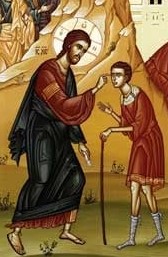 Usual diseases are characterized as “diseases” by Luke and are distinguished from the morbid manifestations due to demonic possession and are mentioned in the following verse. The same clear distinction between "those who were diseased” and those who were "possessed with devils" is made by the other two synoptic evangelists (see Mt 8:16; Mk 1:32).
Usual diseases are characterized as “diseases” by Luke and are distinguished from the morbid manifestations due to demonic possession and are mentioned in the following verse. The same clear distinction between "those who were diseased” and those who were "possessed with devils" is made by the other two synoptic evangelists (see Mt 8:16; Mk 1:32).
Why did Jesus lay his hand on the sick, “he laid his hands on every one of them”, when he could heal them from afar with a word? He seeks personal contact for the following reasons;
a) To show his special interest and affection.
b) To enable the patient's faith to contribute in the healing.
c) To show with this symbolic gesture the transmission of the divine healing power. He did not raise his hands to heaven to pray for the sick or to ask for help, but he put them on them, showing that he had the authority by his own power to give healing.
4,41. Ἐξήρχετο δὲ καὶ δαιμόνια ἀπὸ πολλῶν κραυγάζοντα καὶ λέγοντα ὅτι σὺ εἶ ὁ Χριστὸς ὁ υἱὸς τοῦ Θεοῦ. Καὶ ἐπιτιμῶν οὐκ εἴα αὐτὰ λαλεῖν, ὅτι ᾔδεισαν τὸν Χριστὸν αὐτὸν εἶναι.
4:41 And demons also came out of many, crying out and saying, “You are Christ the Son of God!” But he rebuked them, and would not allow them to speak, because they knew that he was the Christ.
The “demons” experienced the Lord's power both from his confrontation with Satan in the wilderness (see vv. 3-13) and from the healing of the demon-possessed man in the synagogue of Capernaum (see vv. 33-35). They also knew the prophecies of the Old Testament. So, seeing them fulfilled in Jesus, they concluded that he would be the prophesied Christ. This explains their confession and Luke’s word; “they knew that he was the Christ”. This does not mean, of course, that they understood his divine nature and his mission (see comments on 4:3).
For “he rebuked them” see comments on 4:35.
4,42. Γενομένης δὲ ἡμέρας ἐξελθὼν ἐπορεύθη εἰς ἔρημον τόπον· καὶ οἱ ὄχλοι ἐπεζήτουν αὐτόν, καὶ ἦλθον ἕως αὐτοῦ καὶ κατεῖχον αὐτὸν τοῦ μὴ πορεύεσθαι ἀπ᾿ αὐτῶν.
4:42 And at daybreak he departed and went into a desert place. And the people sought him and came to him, and detained him that He might not leave them;
When the next day dawned, "at daybreak" according to Mark the evangelist (1:35), the Lord withdrew into the wilderness. He wanted to avoid the crowds, because he wished to make use of this day, the "one of the Sabbaths", in isolation, silence and prayer (see Mk 1:35). Thus, he both taught his disciples to avoid the ostentation and glory of the world and not to irritate his enemies’ envy.
But the people “sought him”, they sought him persistently, until they found him. And then they “detained him”, made a living wall around him and tried to hinder him so that he could not depart from them. St. Chrysostom asks: Who would not want, to see his face? The Lord was not only admirable when he worked miracles; his face was so extraordinarily graceful that he attracted people. It was prophesied, moreover, that he would be "fairer than the children of men" Ps 45:2(44:3). The unique beauty of his face will also be seen by those who will be worthy to meet him in heaven (see 1 Jn 3:2).
4,43-44. Ὁ δὲ εἶπε πρὸς αὐτοὺς ὅτι καὶ ταῖς ἑτέραις πόλεσιν εὐαγγελίσασθαί με δεῖ τὴν βασιλείαν τοῦ Θεοῦ· ὅτι εἰς τοῦτο ἀπέσταλμαι. Καὶ ἦν κηρύσσων εἰς τὰς συναγωγὰς τῆς Γαλιλαίας.
4:43-44 But he said to them, “I must preach the gospel of the kingdom of God to the other cities also; for I was sent for this purpose.” And he was preaching in the synagogues of Galilee.
To the disciples, who were the first to find the Lord in his place of prayer and informed him of the persistent search of the multitude (see Mk 1:37) and to the inhabitants of Capernaum, who then surrounded him and begged him to stay in their city, he replied that he should preach the kingdom of God in other cities as well. The verb “must” indicates that his work had been predetermined and planned according to the divine will, according to which he would voluntarily live throughout his earthly life (cf. Lk 9:22; 13:33; 17:25; 19:5; 22:37; 24:7; 26; 44; 46).
In the synagogues of Galilee, Jesus preached the joyful news that God's promises of the coming of His kingdom, which the Jews had been eagerly waiting for centuries, were now being fulfilled. His preaching was confirmed and validated by the miraculous signs he was performing (see Mt 4:23; Mk 1:39).
Copyright © 2021 by Orthodox Christian Association «ΧΡΙΣΤΙΑΝΙΚΗ ΕΛΠΙΣ» ΟΡΘΟΔΟΞΗ ΑΔΕΛΦΟΤΗΤΑ. Used by permission. All rights reserved.
